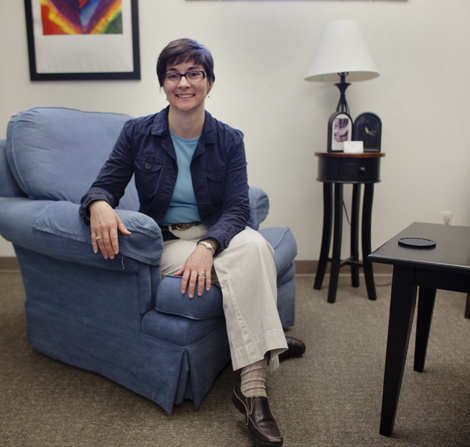With the end of the semester just around the corner, students are feeling pressure from final exams and projects. While stress is a fact of life, it doesn’t have to be a way of life at Mizzou, which offers numerous options for students in need of counseling and behavioral health services.
At the MU Student Health Center, health professionals work together in medical care, behavioral health and wellness. The staff of more than 25 health professionals is prepared to assist the Mizzou student population throughout the semester and during times when stress is particularly intensified. In the academic year 2014-15, MU Student Health Center had more than 40,000 office visits from 70 percent of the student body.
The MU Counseling Center also assists students in learning to cope with emotional, social and academic concerns. The center offers a variety of resources to help students through challenges such as homesickness, college adjustments, depression and anxiety. Some of the services offered include individual psychotherapy, group therapy and consultation.
Services and Programs

The MU Student Health Center provides integrated health care. For MU students, this means that all of the health professionals working at the Student Health Center collaborate across the boundaries of medical health, behavioral health, health promotion and wellness in the best interest of the patient.
The MU Student Health Center and the Counseling Center frequently collaborate with other services on campus to ensure students receive appropriate support. Collaborations across all campus services assist students with appropriate resources. When students need specialized or long-term care not available at the Counseling Center or Student Health Center, a referral coordinator is available to help students connect to community resources that best meet their needs.
“Behavioral Health Services at MU Student Health Center offers consultation and counseling with psychologists and social workers and psychiatric services with psychiatrists and nurse practitioners to MU students,” says Craig Rooney, director of Behavioral Health Services. “In addition to the behavioral health staff, we have 12 primary care providers and three health coaches at the Student Health Center, all of whom assist in providing integrated behavioral health care to our students.”
The integrated health care model ensures that students can receive counseling, medication, coaching or a combination thereof, Rooney says.
“At the MU Counseling Center, we recognize that students come to Mizzou with the expectation of thriving,” says Christy Hutton, assistant director for outreach and prevention at MU Counseling Center. “While the Counseling Center does not have specific session limits, we work from a brief therapy model. The therapist and the client work together as a team to consider both personal and environmental factors that may be contributing to increased stress, anxiety or mood symptoms, and to determine a course of treatment that will be effective for the client.”
Through the variety of services offered by both the Counseling Center and the Student Health Center, the overarching goal is to help students understand what is not working in life, recognize symptoms and develop effective strategies to maintain mental and physical health across time.
Group therapy is often a treatment of choice for young adults experiencing depression, anxiety and relationship issues. The Counseling Center has a robust group therapy program. Groups offered each semester are determined based on clinical need. Most groups meet weekly for the duration of a semester. The center also offers specialized groups that remain open to new members, such as grief support and a people-of-color group whose members have the opportunity to discuss racism, micro-aggressions and other challenges associated with attending a majority white campus.
“The Counseling Center’s mission includes caring for the campus in many ways,” Hutton says. “When groups of students are impacted [by factors] such as the death of a student, racist actions on campus, or highly sensitive events, Counseling Center staff are consistently available to provide support to students. Any student involved with a group in need of support on campus is welcome to contact the Counseling Center to request emotional support for your group or at your event.”
Recognize the Signs

Arming people with knowledge helps better prepare them to help themselves or intervene to help a friend in need. The staff at the MU Counseling Center and the Student Health Center work with organizations and groups throughout the Mizzou campus to educate faculty, staff and students. Over the last few years, the Counseling Center staff have trained more than 3,000 faculty, staff and students to respond effectively to someone who needs help.
In addition to the clinical services available to students, the Counseling Center provides outreach services. The Counseling Center’s crisis intervention team assists faculty, staff, students and parents who are concerned about an MU student. Twenty percent of the students who receive services from the Counseling Center are referred by friends; another 12 percent are referred by faculty or staff.
“The Counseling Center’s mission reaches beyond the clinician’s offices to provide a wide range of outreach and prevention activities to students, faculty, staff and parents,” Hutton says. “Outreach events help increase mental health awareness, reduce stigma associated with mental health problems and teach members of our campus community how to effectively respond with someone who is experiencing mental health problems or is in crisis. We are available for consultation when anyone is concerned about the mental health of an MU student; we are happy to consult about how to approach the person of concern, what resources are appropriate, and how to effectively offer help and support.”
The Counseling Center staff provide more than 200 outreach events each year, reaching nearly 20,000 campus community members. The outreach programs help prepare the Mizzou family to talk about mental health issues and to understand and effectively make referrals to campus mental health resources, Hutton says.
Integrated Care
Services at MU Student Health Center are embedded in a treatment model that includes primary care providers and health coaches who are certified health education specialists. This type of health care environment is called “Integrated Care” because it employs a multidisciplinary team of licensed professionals who share an electronic health record and who can openly coordinate care with one another.
“One of the great things about our model is that professions that have historically been separated in silos of psychiatry, psychology and social work can work together here side-by-side,” Rooney says. “In the Student Centered Health Home model, health professionals can communicate with one another in the best interests of the students.”
Staff at the MU Student Health Center and MU Counseling Center pool resources with other services on campus and in the Columbia community to co-manage the care of students who are receiving services from them. An individual student can receive any of the services alone or in combination with other services that best fit their needs.
“We believe patients benefit by having multiple professionals involved in their care when those professionals are aware of one another’s treatment strategies and can coordinate the most customized treatment plan for each individual,” Rooney says. “Fifty percent of the country’s mental health issues are presented to a primary care provider. By sharing information in the electronic health record, we believe this helps all providers who might have contact with that patient do a better job of patient care.”
The electronic health record used in MU Health Care can be accessed only by providers who have been credentialed into the MU Health Care System.
Getting Help
Students wishing to utilize any of the MU Student Health Center services and programs can call the main number, 573-882-7481, and students also can call the Counseling Center at 573-882-6601. Both centers realize that many students might be calling health professionals on their own for the first time. They recognize the anxiety and questions associated with that step into adulthood, and they utilize a triage model, meaning staff will determine the priority and needs of students and arrange services accordingly. This allows the staff to efficiently use all of its resources and eliminates the question for students regarding whom to call for help.
Numbers You Need
Student Health Center: 573-882-7481
Counseling Center: 573-882-660
After-Hours Crisis: 573-882-6601
Life-Threatening Situations: 911
“During normal business hours, students can call or come in to the Counseling Center to speak to a therapist,” Hutton says. “After hours, we offer phone crisis support with licensed mental health providers.”
Depending on student availability, appointments usually can be scheduled within a week. Students in distress are helped immediately. Life-threatening situations should be directed to 911, and 24-hour behavioral health crisis concerns can be directed to 573-882-6601. Students can always call the main Student Health Center number to speak with an after-hours nurse, and the MU Counseling Center has therapists on call during business hours, as well as after business hours. Students can talk to someone simply by calling the center’s main number.
Other Programs
In addition to the behavioral health and medical care professionals available at the Counseling Center and the MU Student Health Center, student organizations and student-led activities help with outreach of the health services at Mizzou. Student ambassadors promote the services provided by the Student Health Center through peer-education.
- Stressbusters, a student organization, continuously trains volunteer teams of students to provide free five-minute backrubs and health information to other MU students across campus at other events.
- BREATHE, a student organization, provides students with an opportunity to learn and experience mind/body practices for stress management and relaxation centered around the breath.
Health Promotion and Wellness Services at the MU Student Health Center provide services year-round for students. One of the services, health coaching, offers students individual appointments with health coaches to develop customized wellness plans to meet their specific needs and goals. Health coaching is included in the student health fee, and individual appointments provide a great way for students to meet with a professional and explore ways to improve their stress management.
Assistance During Finals Week
Individual health coaching appointments continue to be offered during finals week and after finals week for those students needing support for stress, sleep issues or other health issues. Margaret Jasinski, health coach at the MU Student Health Center and professional adviser for BREATHE said that online relaxation audio recordings and videos are always available to students as a stress-management resource. The audio and video recordings include mindful meditations, relaxation audios, restorative yoga videos, mindful yoga videos and breathing technique videos.
“The online videos are available to listen to or download for free to phones and laptops,” Jasinski says. “Any of these could be used as a study break, as a way to recharge, manage stress and find some peace despite the end of the semester crunch.”
Counseling Center services will continue to be provided through the final week of the semester and throughout the winter break. Behavioral and medical health services also will continue at the MU Student Health Center. The staff members will devote all of their professional energy to providing consultation and counseling to assist MU students in getting through finals week and preparing for managing stress, negotiating family situations, maintaining medical compliance and handling other issues over their break from MU, Rooney says.
For those seeking a little inspiration and guidance during this busy time, the MU Student Health Center and Counseling Center offer inspirational posts as well as links to more information on stressbusting on their social media platforms.




